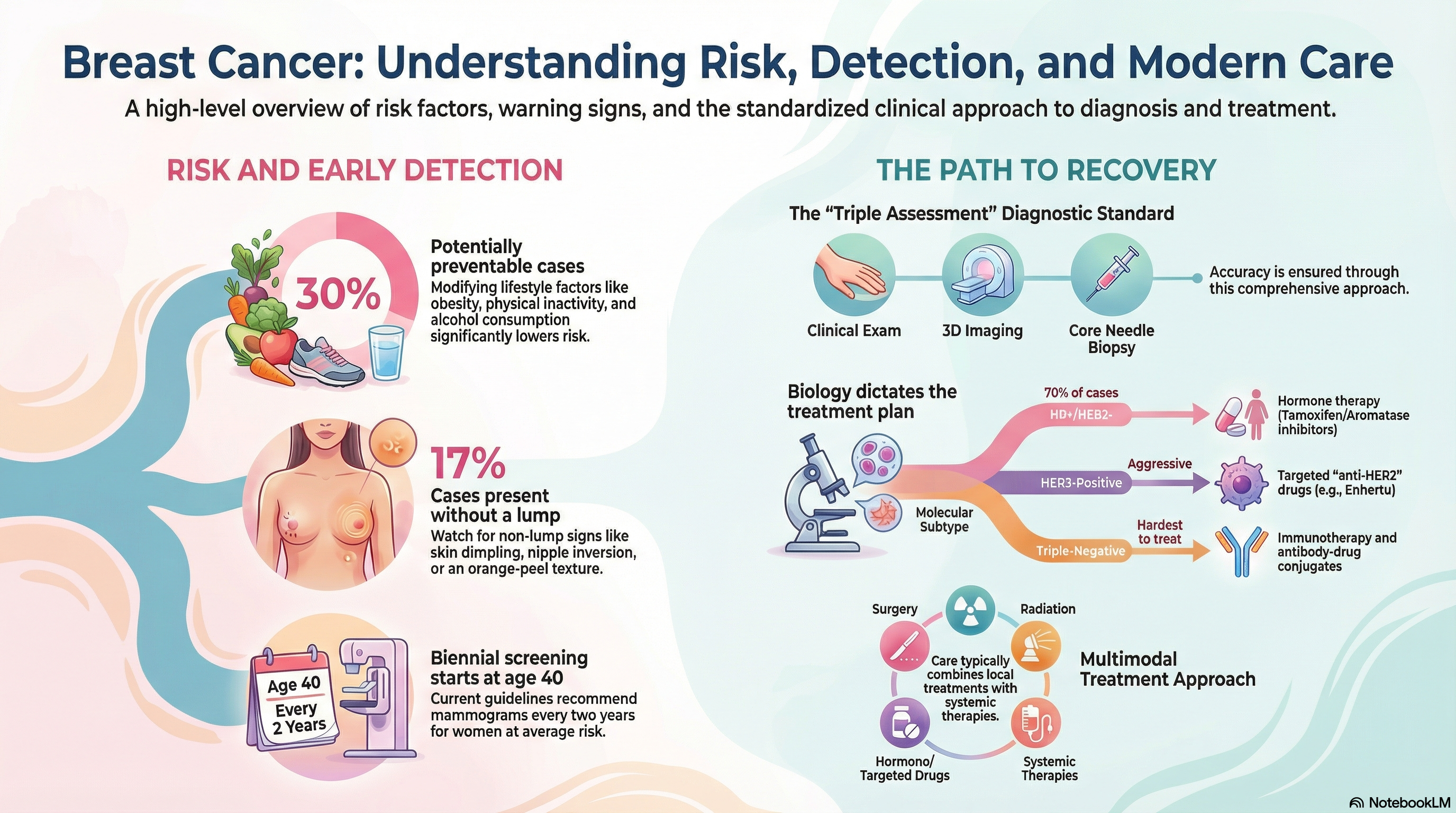What is Breast Cancer?
Breast cancer occurs when cells in the breast begin to grow out of control, typically forming a tumor that can be felt as a lump or seen on an X-ray. It is categorized into two main groups:
-
Non-invasive (In Situ): Such as Ductal Carcinoma In Situ (DCIS), where cancer cells are only in the ducts and have not spread to the surrounding tissue. This is considered Stage 0.
-
Invasive: The most common being Invasive Ductal Carcinoma (IDC), representing 70–80% of all cases.
Doctors now prioritize the molecular subtype of the cancer to determine treatment:
-
HR+/HER2-: The most common (70%), which responds well to hormone therapy.
-
HER2-Positive: Once aggressive, now highly treatable with targeted "anti-HER2" drugs.
-
Triple-Negative (TNBC): Historically the hardest to treat, now seeing breakthroughs with immunotherapy and new "smart" drugs (antibody-drug conjugates).

Causes of Breast Cancer
While the exact cause of any individual case is often unknown, breast cancer is driven by a combination of genetics, hormonal exposure, and lifestyle factors.
-
Genetics: About 5–10% of cases are hereditary. Mutations in the BRCA1 or BRCA2 genes are the most well-known, carrying a lifetime risk of up to 70%. Other genes like PALB2 and ATM also play a role.
-
Hormonal Exposure: Factors that increase lifetime estrogen exposure, such as starting periods before age 12, beginning menopause after age 55, or taking certain types of hormone replacement therapy, can increase risk.
-
Physical Factors: Having dense breasts on a mammogram is a significant risk factor, as it can both hide tumors and increase the biological risk of cancer developing.
-
Lifestyle: Obesity (especially after menopause), physical inactivity, and alcohol consumption are modifiable risks. Approximately 30% of cases are potentially preventable through lifestyle changes.
Symptoms of Breast Cancer
The most common sign is a new lump or thickening in the breast or armpit. However, roughly 17% of symptomatic cases present with "non-lump" symptoms:
-
Nipple Changes: Inversion (pulling inward), persistent rash, or discharge (especially if bloody).
-
Skin Alterations: Dimpling, redness, or an "orange-peel" texture (peau d'orange).
-
Shape Changes: Any unexplained change in the size or shape of one breast.
-
Pain: While most breast cancers are painless, a new, constant pain in one specific spot should be evaluated.
Diagnosis of Breast Cancer
Modern diagnosis follows a "Triple Assessment" to ensure the highest accuracy.
-
Clinical Examination: A physical exam of the breast and lymph nodes by a healthcare provider.
-
Imaging: 3D Mammography (Tomosynthesis) is the gold standard, as it detects more cancers than traditional 2D mammograms. Ultrasound is used for women with dense breasts or those under 30. MRI is reserved for high-risk patients or complex cases.
-
Biopsy: If a suspicious area is found, a core needle biopsy is performed. This provides a tissue sample to test for receptors (ER, PR, and HER2), which dictates the entire treatment plan.
-
Staging: Doctors use the TNM system (Tumor size, Node involvement, Metastasis), but now also include the "Prognostic Stage," which incorporates the tumor’s grade and molecular markers.
Treatment of Breast Cancer
Treatment is multimodal, often combining surgery with systemic therapies to ensure any microscopic cells are eliminated.
Local Treatments
-
Surgery: Many women are candidates for lumpectomy (breast-conserving surgery) followed by radiation. Mastectomy is used for larger or multiple tumors. Sentinel lymph node biopsy is used to check for spread while sparing healthy nodes.
-
Radiation: Used to destroy any remaining cells after surgery. Newer "accelerated" schedules can shorten treatment time.
Systemic Treatments
-
Hormone Therapy: For HR+ cancers, medications like Tamoxifen or Aromatase Inhibitors are used for 5–10 years.
-
Targeted Therapy: Drugs like Enhertu are "game changers" for HER2-positive and even "HER2-low" cancers.
-
Immunotherapy: Drugs like Pembrolizumab have transformed the treatment of Triple-Negative breast cancer.
-
CDK4/6 Inhibitors: Newer drugs that help prevent recurrence in high-risk, hormone-positive cases.
Prevention of Breast Cancer
While some risks are beyond your control, there are proactive steps to significantly lower your risk.
-
Screening: As of 2024, the USPSTF recommends biennial mammograms starting at age 40 for all women at average risk. High-risk women (BRCA carriers) should start annual MRI and mammograms as early as age 25–30.
-
Lifestyle: Maintain a healthy weight after menopause, engage in regular physical activity, and limit alcohol to less than one drink per day.
-
Breastfeeding: Studies show that breastfeeding for a total of one year or more across all pregnancies reduces risk.
-
Risk-Reducing Medications: High-risk women may benefit from "chemoprevention" using drugs like Tamoxifen or Raloxifene, which can cut the risk of invasive cancer by about 50%.
-
Surgical Prevention: For those with very high genetic risk (BRCA1/2), risk-reducing mastectomy or ovary removal can reduce the risk of cancer by over 90%.





